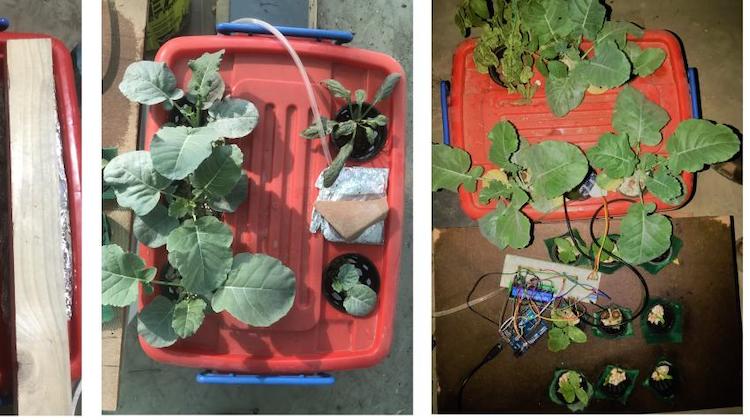By J Nastranis
NEW YORK | KARACHI, Pakistan, 18 June 2023 (IDN) — A member institution of the United Nations Academic Impact (UNAI) in Pakistan, the Iqra University, appears to have spared the South Asian country of an impending food crisis, predicted within two years.
Agriculture is an indispensable component of economic growth, food security, job creation, and poverty reduction in developing countries like Pakistan. It accounts for almost a quarter of Pakistan’s GDP and employs over one-third of its population.
The team of Dr Mansoor Ebrahim, Dr Kamran Raza, and Dr Hasan Adil at the university’s Faculty of Engineering, Sciences, and Technology has developed ‘Smart Farming,’ an innovative urban farming solution of its own, reports UNAI.
The project’s primary goal is to create a test bed based on the hydroponics technique that integrates the so-called Internet of Things (IoT) and systems with artificial intelligence (AI) to create an effective, controlled, and autonomous environment for plant growth.
Smart Farming is the adoption of Web 5.0 technologies into agriculture, with hydroponics being a notable example. This process involves cultivating plants without soil in nutrient-rich water. Dr Mansoor said that despite the various projects underway around the globe, there is yet to be a comprehensive solution providing all related elements in one package.
This project strives to provide an innovative solution to various agricultural problems in Pakistan, combining both physical and digital technologies for maximum sustainability and adaptability.
In addition to designing a completely monitored hydroponic farming system, the team has also incorporated an IoT interface in order to measure Total Dissolve Solids (TDS), PH, humidity levels and temperature, and perform automated operations to ensure optimal crop health.
Outlining the project’s technological elements, Dr Mansoor explained that the sensors are employed to ensure a steady state of plants. Data collected from the IoT sensors is then processed and analysed by an AI-based system trained on both images of plant stages as well as live pictures of crop yield provided by drone cameras set to collect information at regular intervals.
The overall system can be managed and reset conveniently using a user-friendly, mobile-based application. Its pioneering framework promotes a number of advantages, such as superlative water saving of nearly 90 per cent, 25 per cent reduction in fertilizers and low area utilization, and leads to substantial cost savings on transportation and carbon emissions.
As a result, ‘Smart Farming’ has been praised at the national level and has been awarded funding by the Higher Education Commission of Pakistan.
Dr Mansoor, the project lead, points out that favourable results in the first phase are already visible, with many vegetables successfully grown and initial targets achieved. They have been able to perfect the nutrient solution that has yielded excellent outcomes. This remarkable crop output clearly illustrates that ‘Smart Farming’ is a promising and environmentally friendly method of cultivation. Moreover, its automated system reduces labour efforts, cost and area needed for cultivation, thereby making it suitable for urban setting.
Perfecting the algorithm still requires vast amounts of data sets to be fed into the system, training it and enabling it to make accurate decisions and craft flawless communication for its eventual purpose—automating the agricultural process altogether. Until that is achieved, this project will need to continue being a collaborative effort between machines and people,” said Dr Mansoor.
The initiative has tremendous potential for replication on a large scale, which could both sustain and give strength to the current labour market of the farming world, he declares.
Until now, production has been interfered with due to numerous socio-economic issues, such as depletion of farmland, climate variation, migration from rural areas to cities, and most significantly water scarcity and salinization. Irrigation also plays an indispensable role since farming relies greatly on it.
Nearly 90 per cent of water usage is for irrigation. Also, Pakistan loses a vast majority of its supply due to inadequate management. In order to combat the demand, farmers turn to low-grade groundwater that results in salination of valuable land. [IDN-InDepthNews]
Image: An AI-backed project created a fully managed and controlled hydroponic farming environment. Credit: Iqra University.
Visit us on Facebook and Twitter.
IDN is the flagship agency of the Non-profit International Press Syndicate.
We believe in the free flow of information. Republish our articles for free, online or in print, under Creative Commons Attribution 4.0 International, except for republished articles with permission.

